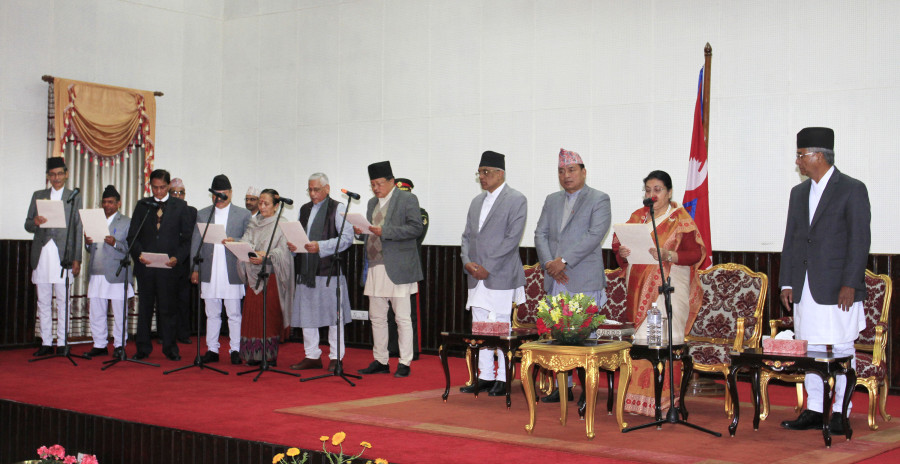Politics
President, acting on Cabinet decision, removes governors of all seven provinces
While the Oli administration’s decision is constitutionally sound, it is politically authoritarian, constitutional experts say.
Tika R Pradhan
In an unexpected decision, the KP Sharma Oli administration on Sunday relieved the governors of all seven provinces of their duties. A Cabinet meeting held earlier in the day took the decision to remove the governors, all seven of whom had been appointed by the Sher Bahadur Deuba administration in January 2018.
“President Bidya Devi Bhandari has relieved the governors of all seven provinces of their duties as per Article 165 (1) (b) of the constitution in line with the recommendation from the government to that effect,” read a notice issued by the Office of the President.
The appointment of the governors, which is primarily a ceremonial role, had become a highly contested issue last year. The then CPN-UML and CPN (Maoist Centre), which together swept the 2017 elections, had argued that appointments were the prerogative of the incoming government. The Oli government took the reins from the Congress’ Deuba in February, a month after the governors were appointed.
The Deuba government had appointed Govinda Bahadur Tumbahang of Dhankuta as governor of Province 1; Ratneswor Lal Kayastha of Kathmandu for Province 2; Anuradha Koirala of Kathmandu for Province 3; Baburam Kunwar of Arghakhanchi for Gandaki Province; Umakanta Jha of Dhanusha for Province 5; Durga Keshar Khanal of Surkhet for Karnali Province; and Mohan Raj Malla of Kailali for Sudur Paschim Province.
Though the Oli administration in July last year revoked all the decisions of the Deuba government take after August 30, 2017, it had refrained from removing the governors on the grounds that it was studying the constitutional and legal ramifications of their removal.
Kundan Aryal, Oli’s press advisor, said that the Cabinet decided to remove the governors because the Deuba government had appointed them in an “irrational manner”.
“The government just corrected an unethical decision made by the outgoing [Deuba] government, as the appointments were made after the election results were out,” Aryal told the Post.
Aryal, however, did not say why the Cabinet took the decision so abruptly and at this time.
Energy Minister Barsha Man Pun said that the government had been working towards this decision for a long time and had acted at an opportune moment.
“Governors must represent the government,” Pun said.
The Nepali Congress, the primary opposition, was quick to call the Oli administration’s decision biased.
“The Cabinet never took into account the performance of the governors,” said Bishwo Prakash Sharma, spokesperson for the Nepali Congress. “At a time when the ruling party is supposed to move ahead in coordination with the opposition, the government has invited conflict by not consulting with the primary opposition while taking such a big decision.”
The Congress said it smelt a “conspiracy” in the works.
“The decision to remove the governors came after the Election Commission published its code of conduct for the by-elections, which are scheduled for November 30,” said Sharma. “This decision raises some ethical questions.”
Though the constitution allows the government of the day to remove governors, constitutional experts say it must explain the rationale behind such a decision.
Article 165 (1) (b) states that the office of governor shall become vacant “if his or her term of office expires and he or she is removed from office by the President prior to [the] expiration of the term”.
“The government can dismiss governors according to the philosophy and doctrine of the
constitution, but such actions must be just, fair and rational,” said Bhimarjun Acharya, an expert on constitutional affairs. “Why the government sacked all the governors at this point of time demands an answer. Is there a state of emergency in the country?”
According to Acharya, the government’s move is tantamount to a misuse of power.
“It is not justifiable. This incident shows that both the government and the President are inclined towards arbitrary actions,” said Acharya.
Acharya also cited Article 165 (2) of the constitution, which states: “If the office of the Chief of State [governor] of any State falls vacant, the President may so designate the Chief of State of another State to act as such also for such State.”
“This means that the constitution does not imagine the offices of all governors going vacant at the same time, creating a vacuum,” said Acharya. “This decision shows a gross monopoly and misuse of power on the part of the government.”
Bipin Adhikari, former dean of the School of Law at Kathmandu University, however, said that some decisions should be viewed from different points to judge whether they are just and fair.
“The decision to remove governors en masse may be right constitutionally, but politically, it is an authoritarian move,” Adhikari told the Post. “If the government had any issue with their appointments, they could have been removed as soon as the Oli administration took the oath of office and secrecy. But dismissing them when they have almost completed two years of their term shows that the government is against the checks and balances the constitution envisions.”




 14.12°C Kathmandu
14.12°C Kathmandu















